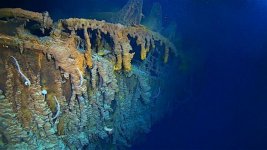Bum Luck
Silver Member
- May 24, 2008
- 3,482
- 1,282
- Detector(s) used
- Teknetics T2SE, GARRETT GTI 2500, Garrett Infinium
- Primary Interest:
- All Treasure Hunting
Just a couple of the links out there:
BBC
The first people to dive down to the Titanic in nearly 15 years say some of the wreck is deteriorating rapidly.

ABC
First manned Titanic expedition in 14 years reveals 'shocking' deterioration
Lori Johnson, one of the scientists of the expedition, said the rate of deterioration will speed up as natural types of bacteria work "symbiotically" to eat away the iron and sulphur.
"The future of the wreck is going to continue to deteriorate over time," Johnson said in a statement Wednesday. "It's a natural process."
The most famous shipwreck of all time is well on its way to collapsing in a cloud of dust into the seafloor, nothing left to see. I think those of us that dive on wrecks are somewhat familiar with the process, although it certainly varies with the materials and location of the wrecks.
The sad part to me is the loss of the experience that not only us, but future generations would be able to appreciate and learn from if there was some sort of rational plan and process other than the "hands off - it's mine" and "let it lay on the ocean floor as a cultural resource" of assorted governments and archaeologists while they do little or nothing but keep them from the rest of humanity that ultimately and in a larger sense those wrecks surely belong to.
Cultural Resource - bah! Once it's been digested and reduced to powder by iron-eating bacteria, it's gone. As in Forever.
I understand the reasoning behind considering them grave sites, and they are of course, but so are cemeteries in Europe that recycle graveyards and tombs to accommodate new arrivals. Surely we can keep some things for us to see and touch and have in the future for our human family? Extraodinary things that let us appreciate what has gone before.
Where would humanity be without the treasures we recovered from the Atocha, the 1715 wrecks, the Vasa, the Roskilde Viking Ship Museum, the Antikythera wreck, and many others?
This is not an argument for an all-the-same plan, because the rates of decay aren't the same all over.
But - the salvors that are working the 1715 wrecks are bringing up things like this for us to appreciate:

We can preserve and display them, or turn our backs on them forever. Which will it be?
BBC
The first people to dive down to the Titanic in nearly 15 years say some of the wreck is deteriorating rapidly.

ABC
First manned Titanic expedition in 14 years reveals 'shocking' deterioration
Lori Johnson, one of the scientists of the expedition, said the rate of deterioration will speed up as natural types of bacteria work "symbiotically" to eat away the iron and sulphur.
"The future of the wreck is going to continue to deteriorate over time," Johnson said in a statement Wednesday. "It's a natural process."
The most famous shipwreck of all time is well on its way to collapsing in a cloud of dust into the seafloor, nothing left to see. I think those of us that dive on wrecks are somewhat familiar with the process, although it certainly varies with the materials and location of the wrecks.
The sad part to me is the loss of the experience that not only us, but future generations would be able to appreciate and learn from if there was some sort of rational plan and process other than the "hands off - it's mine" and "let it lay on the ocean floor as a cultural resource" of assorted governments and archaeologists while they do little or nothing but keep them from the rest of humanity that ultimately and in a larger sense those wrecks surely belong to.
Cultural Resource - bah! Once it's been digested and reduced to powder by iron-eating bacteria, it's gone. As in Forever.
I understand the reasoning behind considering them grave sites, and they are of course, but so are cemeteries in Europe that recycle graveyards and tombs to accommodate new arrivals. Surely we can keep some things for us to see and touch and have in the future for our human family? Extraodinary things that let us appreciate what has gone before.
Where would humanity be without the treasures we recovered from the Atocha, the 1715 wrecks, the Vasa, the Roskilde Viking Ship Museum, the Antikythera wreck, and many others?
This is not an argument for an all-the-same plan, because the rates of decay aren't the same all over.
But - the salvors that are working the 1715 wrecks are bringing up things like this for us to appreciate:

We can preserve and display them, or turn our backs on them forever. Which will it be?



